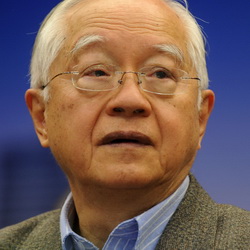Opinion
Experts encourage more social reform
By Ed Zhang (China Daily)
Updated: 2010-01-27 08:02
 |
Large Medium Small |
Economic researchers representing academic institutions and government-backed research bodies, gathered at a Beijing symposium yesterday, arguing one after another that corruption and inequality are preventing China from emerging more quickly out of the shadow of the global recession.
 |
|
Wu Jinglian, economist, senior research fellow in Development Research Center of the State Council. |
Wu Jinglian, regarded by many symposium participants as their teacher and role model, described China as being in a race against the spread of "crony capitalism", according to a speech he is due to give today.
Official corruption and income disparity are threatening China's social harmony just as much as they are the nation's economic development, researchers said.
Leaders in Beijing must have been aware of the problems, Xu Chenggang, a professor at Hong Kong University said to China Daily, though "in some aspects, they are still worsening."
Opinions expressed at the meeting were seen as important by the Chinese press because some of those present are also on the drafting board of China's 12th Five-Year Plan, its 2011-2015 social and economic program.
According to organizers, the symposium was prepared to mark Wu Jinglian's 80th birthday, and to praise his unwavering support for China's economic and political reforms.
Wu served as an economic advisor to several premiers in the initial years of the reforms and is now teaching economics at the Shanghai-based China-Europe International Business School.
He was also among the first social scientists in China to call for attention to such concepts as rent-seeking (how official corruption works) and "crony capitalism", and their potential consequences for China.
Some of the questions that Wu raised in the 1990s have yet to be answered, said Qin Xiao, PhD and chairman of the China Merchants Group. China has yet to provide a clear-cut answer on how it will build an incorruptible government, prevent large State-owned companies from interfering with the market order, provide more public goods than just numerical growth, and to carefully regulate the price of public goods, while keeping the market economy robust, he said.
Qin urged the government not to be intoxicated by the words of praise it has received so far, and instead waste no time in addressing the aforementioned thorny issues by allowing more participation from civil society.
This participatory approach will also serve to keep the economy in balance, according to Yao Yang, a professor with the National School of Development at Peking University. He cited the example of a proposed multi-billion yuan maglev project, planned by local officials to connect Shanghai and Hangzhou, which was canceled after public hearings. Participation, he said, reduces both social tension and financial waste.
Ren Xingyuan, from the State Council Development Research Center, called for the government to take seriously the socio-psychological toll of official corruption and income disparity. "These issues tend to arouse an immediate and widespread response on the Internet," she said. Not handled properly, these issues can erode trust in the government and cause anxiety and fear on an everyday level, which would in turn be passed down from one generation to the next.
| ||||
The challenges to social development will multiply now that large numbers of rural residents are expected to leave farms and move into the cities over the next decade or so, said Liu He, a senior economist with the central government.
On the technical side, according to Liu, the Chinese solution could be that more people will be working in very large mega cities while living in well-connected surrounding communities.
But on the side of social development, he said, what China must do is to guarantee that the new urban residents - mostly migrants from rural farms - must not be reduced to an emerging class of urban poor. The priority in the government's future urban policy plan must be to maximize the interests of the fresh-off-the-farm population, and enable them to join the urban middle class. This, Liu said, will be a priority of China's 12th Five-Year Plan.













